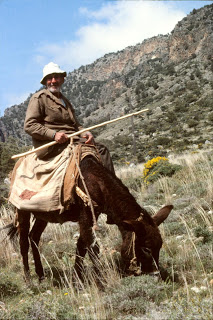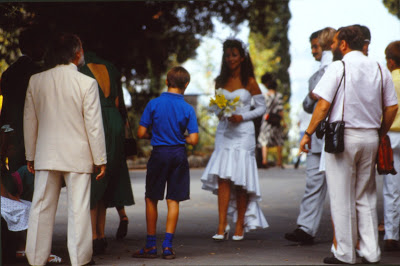
Falkland Road.
David Allan writes:
“When you experience a ‘bad’ event, try to imagine what possible good could come out of it –
“Even if it’s many years from now or several cause-and-effects later, or even if it just makes you more empathetic or prepared next time.
“Not convinced?
Avoid the extremes, if you want to avoid very ‘bad’ events.
Jesus advised us to take the path which is straight, and avoid the extremes on either side.
“The idea that ‘challenges help us to grow’, that ‘we develop as a result of the hard things that happen to us’, is the classic hero’s journey.”
“You can find potentially bad in what seems good.
Good and bad
“Once you move past ‘good and bad’ you become less concerned about outcome; you become more accepting to how things evolve naturally.”
From The Tao Book and Card Pack by Timothy Freke:
When an old farmer’s stallion wins a prize at a country show, his neighbour calls round to congratulate him, but the old farmer says, “Who knows what is good and what is bad?”
The next day some thieves come and steal his valuable animal.
His neighbour comes to commiserate with him, but the old man replies, “Who knows what is good and what is bad?”
A few days later the spirited stallion escapes from the thieves and joins a herd of wild mares, leading them back to the farm.
The neighbour calls to share the farmer’s joy, but the farmer says, “Who knows what is good and what is bad?”
The following day, while trying to break in one of the mares, the farmer’s son is thrown and fractures his leg.
The neighbour calls to share the farmer’s sorrow, but the old man’s attitude remains the same as before.
The following week the army passes by, forcibly conscripting soldiers for the war, but they do not take the farmer’s son because he cannot walk.

“It’s not that the farmer is unengaged in life. It’s not that he is unable to be happy or sad.
“He sees the bigger picture.
“He know that he can’t stop things from happening, but he can control how he reacts to them.
“And it’s often not the experience that matters as what you do with that experience.”

Blessed are the meek: for they will inherit the earth. (5:5)
Blessed are the merciful: for they will be shown mercy. (5:7)
…
Buddhists believe in taking the The Middle Way, avoiding extremes.
The taoist Lao Tzu said:
The great Way is easy, yet people prefer the side paths.
Be aware when things are out of balance. Stay centered within the Tao.
Stay Centered – A Simple Explanation of Absolutely Everything.
“Another way to ‘stay centered’ is expressed by the Golden Mean, which Aristotle described as keeping to the beneficial middle and avoiding extremes.”
In philosophy, especially that of Aristotle, the golden mean is the desirable middle between two extremes, one of excess and the other of deficiency.
…
According to theologian Gunnar Samuelsson, Jesus did not die on a cross.
The Legend Of Jesus Christ – Text-only version

Photo from Photobucket
Let’s look at Taoism.
1. The Force
Consider Luke Skywalker and how Obi-wan Kenobi taught him about “the Force”.
Luke had to avoid being distracted by things like fear and anger.
On one occasion, Luke was trying, without success, to avoid laser blasts from a ‘remote’.
When Obi-wan Kenobi placed a helmet on Luke’s head so he couldn’t be distracted, he easily deflected the remote’s laser blasts.
The idea is that when you are aware of the ‘Tao’ and feel ‘the force’, you can flow with it, and the right action appears for itself, spontaneously.
(More here: http://www.exn.ca/starwars/taoism.cfm / http://www.belief )

The economy does not work when things are out of balance.
2. What are the essentials of Taoism?
(http://www.godquest.org/taoism.htm / Http://www.crystalinks.com/taoism.html)
Some Taoists and Christians and others believe that bliss can be achieved when:
1. One is compassionate
2. One is moderate (Avoid large numbers?)
3. One is humble (Avoid large numbers?)
4. Everything is in balance (+ X – X rather than +X – 1000X?)
5. One is in tune with the Holy Spirit or the Tao or whatever one wants to call it. One goes with the flow.
6. One avoids the use of force; one avoids pitting one’s will against the universe.
..
The Christians talk about God’s spirit.
The Taoists talk about the Tao being a force that flows through everything.
3. The Tao and Yin and Yang:
When the Tao is in balance one can be happy. (+ X – X rather than +X – 1000X?)
There is Yin and there is Yang (just as there is black and white, up and down, male and female).
‘The Tao surrounds everyone and one must listen to find enlightenment.’
True Taoism does not get bogged down with theology. “The Tao that can be named is not the true Tao.”
Taoists love their enemies. “I am good to the man who is good to me, likewise, I am also good to the bad man.”

The USA’s Phoenix programme (left) involved torturing and killing civilians. The USA’s ISIS force is also going to extremes. www.thesleuthjournal.com
4. Wu wei is action through inaction; ‘a practice of minimal action, particularly minimal violent action’.
Don’t force yourself or others to be compassionate. Be spontaneous.
Genuine love is spontaneous love.

The USA is out of balance. www.youtube.com
“The Master does not see evil as a force to resist, but simply as an opaqueness, a state of self-absorption that is in disharmony with the universal process, so that, as with a dirty window, the light can’t shine through.
“The Tao regulates natural processes and nourishes balance in the Universe.

5. Henry C K Liu wrote in the Asia Times about Taoism.
“To employ poison to attack poison is a Taoist principle.”

Americans carrying out torture in Vietnam.
How should we act?
We should avoid producing unintended consequences.
“Not taking premature or unnecessary actions keeps all of one’s options open, so that the most appropriate action remains available.
“To follow the dao (path) of life is to go with the natural flow of life and to avoid going against it.
“The ethical theories of Taoism lean toward passive resistance, believing that evil, by definition, will ultimately destroy even itself without undue interference.
“Yet it would be a mistake to regard Taoism as fatalistic and pessimistic, instead of the ultimate sophistication in optimism that it is.
“Only by not applying effort can one achieve that state in which nothing is not attainable effortlessly.
“A little ambition is a good thing. Total elimination, even of undesirables, is an extreme solution, and it is therefore self-defeating.
“Life is a prison from which one can escape only if one does not try to escape. It is the desire to escape that makes a place a prison, and the desire to return that makes it a home. Home is not where one is, it is where one wants to return.”

From Buddhism: “Set your heart on doing good. Do it over and over again, and you will be filled with joy.”
From Islam: “There is a reward for your treatment of every living thing.” Muhammad also said: “None of you is a believer until you like for others what you like for yourself.”
From Christianity: “Do unto others as you would have them do to you.”
Veritopian refers to Yin & Yang Mathematics. http://everythingforever.com/st_math.htm
Related posts:
Views: 0
 RSS Feed
RSS Feed

















 October 9th, 2020
October 9th, 2020  Awake Goy
Awake Goy 



 Posted in
Posted in  Tags:
Tags: 
















